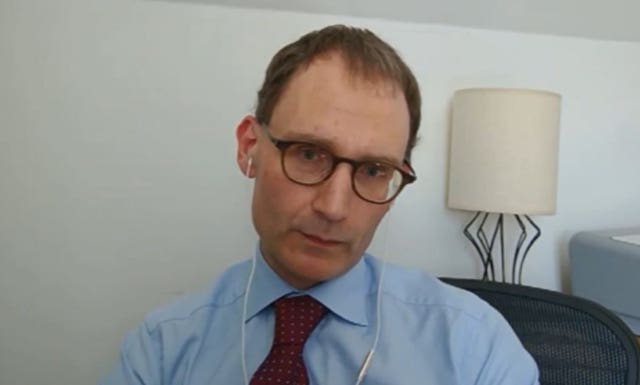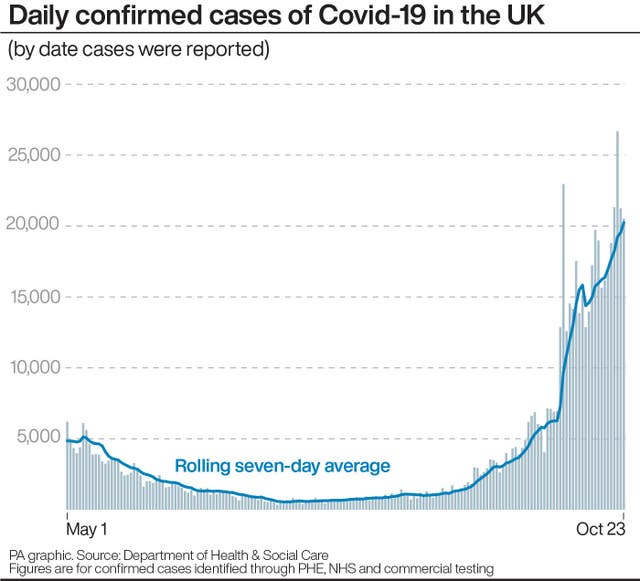
Ministers may be forced to close schools to older children if coronavirus cases continue to increase at the current rate, a scientist has warned.
Professor Neil Ferguson, whose modelling led to the original lockdown in March, said the NHS would soon be unable to cope unless the spread of the disease was stemmed.
He said there were currently 8,000 people in hospital with coronavirus – around a third of the peak earlier this year – and that numbers were continuing to rise.
“It is a worrying situation,” he told the BBC Radio 4 Today programme.
“If the rate of growth continues as it is it means that in a month’s time we will above that peak level in March and that is probably unsustainable.
“We are in a critical time right now. The health system will not be able to cope with this rate of growth for much longer.”
His warning came as South Yorkshire became the latest region to enter the tightest Tier 3 restrictions in England following Liverpool City Region, Greater Manchester and Lancashire.
Prof Ferguson said it would be another week or two before it became clear whether the stricter measures would have an impact on case numbers.
 Professor Neil Ferguson (Parliament TV/PA)
Professor Neil Ferguson (Parliament TV/PA)
He said the restrictions on households mixing should have a “significant effect”, but added it may not be enough and further action may be needed.
“If we go beyond that there is a limit to what we can do in terms of reducing contacts, short of starting to target, for instance, the older years in schools and sixth form colleges where we know older teenagers are able to transmit as adults.
“Of course, nobody wants to start moving to virtual education and closing schools even partially. The challenge may be that we are not able to get on top of the transmission otherwise.”
Boris Johnson is determined to avoid schools closing again because of the damaging effect on children’s well-being and education.
However Prof Ferguson said that while there has been a slowdown in infections among 18 to 21-year-olds they were continuing to rise in other age groups.
Ministers have said they hope the latest restrictions in England will slow the disease sufficiently to enable families to spend Christmas together.
Prof Ferguson said the Government would have to assess the balance of risks when it came to deciding whether that was possible.
“It risks some transmission and there will be consequences of that. Some people will die because of getting infected on that day,” he said.
“But if it is only one or two days the impact is likely to be limited. So that is really a political judgment about the cost versus the benefits.”
The latest figures suggest the number of new daily cases across England doubled in a fortnight – although some scientists have said the rate of spread may be slowing.
The Office for National Statistics infection survey estimated there was an average of 35,200 new cases per day in the community in England between October 10 and 16.
That was up 26% from an estimated 27,900 per day for the period from October 2 to 8 and just over double the 17,200 per day from September 25 to October 1.
 (PA Graphics)
(PA Graphics)
The Scientific Advisory Group for Emergencies (Sage) said the reproduction number, or R value, for the whole of the UK had nudged down to between 1.2 and 1.4. Last week it put the figure at between 1.3 and 1.5.
Meanwhile, talks have been continuing between the Government and local leaders in Nottinghamshire, with parts of the county expected to enter Tier 3 on Wednesday.
The council in Warrington in Cheshire – where many residents commute to Manchester and Liverpool – has confirmed it will be moving to Tier 3 on Thursday. It means households will be banned from mixing except in parks and other open spaces, while pubs and bars will have to close unless they serve meals.
Three more areas – Coventry, Stoke and Slough – have moved into Tier 2, the second highest alert level.
Sheffield City Region mayor Dan Jarvis – who secured a £41 million support package for South Yorkshire – said he would not hesitate to ask the Government for more financial assistance if it proved necessary.
“The Government has been committed to level up the country. I think there is a real risk the levelling up agenda will be derailed,” he told the Today programme.
“The North has been hit disproportionately by this pandemic. Instead of a reason to delay levelling up, I think the current crisis is the most powerful argument for getting on with it.”



Comments: Our rules
We want our comments to be a lively and valuable part of our community - a place where readers can debate and engage with the most important local issues. The ability to comment on our stories is a privilege, not a right, however, and that privilege may be withdrawn if it is abused or misused.
Please report any comments that break our rules.
Read the rules hereComments are closed on this article